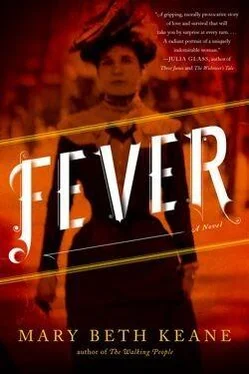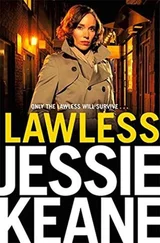He was good for three weeks after that. He wasn’t working, but he stayed away from the bars, and sometimes made supper, and bought the newspaper for Mary, and went for long walks. When the message came that she had to go to Oyster Bay sooner than planned because the regular cook’s grandchild had come early, he acted as if she were lying, as if she had made it up to get away from him. So he disappeared, and when he finally came home just in time to say good-bye, she slipped past him and down to the street. She didn’t want to look at him. She didn’t want to hear herself say all the things she knew she’d have to say.
The remainder of his toy stock — a set of two play cups and saucers for girls, a china cat with one blue eye and one brown, marbles, a checker set, nearly a dozen toy soldiers without the faces painted on — all of it had been sitting in a box in the corner of their bedroom for the past six months. Before leaving for Oyster Bay, Mary left the whole crate outside the door of the Borriello family.
• • •
Looking back from the quiet of North Brother, her bare feet covered in wet sand and with an egret for company, the water lapping at the fallen hem of her skirt, it all seemed like a very long time ago, far longer than just a couple of years. Fighting with Alfred, that hot spring and summer of 1906, up and down the stairs of their building with sweat running in streams between her breasts, it all seemed like a fever that had now broken, and like so many of the patients she’d nursed, now she was on the other side, amazed that her skin was cool to the touch, bewildered by the stark blankness of everything without that heat to color it, without those swings from joy to rage. At the center of everything, like a selection of notes played at a lower register while the rest of the song sways and dives around it, was the fact that she loved him. She’d loved him since she was seventeen, and even when she wanted to take her skillet and swing it at him, even that time when she did take her skillet and swing it at him, she loved him. Everything would be easier if she didn’t.
• • •
On the evening before Alfred’s visit, Mary dragged the tub from a cobwebbed corner of her hut and out to the middle of the room. She ran a damp cloth along the inside to pick up any dust, and then she poured in kettle after kettle of boiling water until it was halfway full. She usually went up to the hospital when she wanted a bath — they had tubs there with running hot and cold water — but she didn’t want to be seen or questioned or rushed. She readied her soap, her tooth powder, her washcloth, her shampoo, and when she stepped in and lowered herself, the water rushed for the edges and sloshed over the brim. It ran in streams toward the door.
Mary washed. She pinched her nose and dipped her head under the surface and then rubbed the shampoo into her scalp with her fingertips. She dunked again to rinse. She soaped her neck, her long arms, her legs by lifting one out above the water in a straight line and then the other. She stood up, quickly, and soaped her breasts, her belly, her hips, between her legs, and plunged back into the exquisite warmth of the water and wondered why she didn’t perform the same ritual more often.
She soaked, and thought about what attitude she should take when she greeted him. It was unforgiveable, how little he’d been in touch. If it were Alfred who’d been locked up, she would have sent him the things he missed the most. She would have tried to see him even if they told her there were no visitors allowed. But it wasn’t Alfred who’d been taken away, and what was the point of saying how she would have been, and how he should have been, and marching out the long list of grievances when he was coming, finally, tomorrow? Maybe he was turning over a new leaf. Aunt Kate, before she died, said he was a rogue, but the charmingest, handsomest rogue she’d ever seen in her life, and Mary knew she liked him, because whenever he stopped up for her, Aunt Kate made him sit into a plate of stew, and if they had it, a dram of whiskey. Later, Aunt Kate would go around her rooms pointing out pieces Mary could have when she married. Her mantel clock. Her lace-fringed pillows. “And if I’m gone,” she said, “I’ve written it all down for Paddy. ‘On Mary’s wedding day,’ I wrote, and a list of things to be yours.”
Mary pulled a clean dressing gown over her head, removed a mason jar from the shelf, and emptied the tub jar by jar until it was light enough to push to the door, where she tipped it. She listened to the water rush down the single stair, onto the grass, into John Cane’s pansies and snapdragons. He would not have to water in the morning.
She went about brushing and separating her hair. She had no curlers, so she twisted each section around her finger and then pinned it against her scalp. She had only a dozen pins, and her hair was thick and long, so twice she’d run out and had to start over again with a better sense of proportion. He would probably notice right away the pains she’d taken. He knew her well enough now to know she didn’t wake up with curls. Or maybe he’d never noticed.
She counted the years since they met: almost twenty-five. Two years fewer than she’d been in America. She was employed by the Mott family the first time she saw him, and even though she was washwoman she also worked a little in the scullery as assistant to the cook. It was the agreement they’d come to at the office. If she was ever to be hired as head cook, she had to have experience. She’d left her work trimming beans when she heard the bell ring. Where was the maid? She wiped her hands, and as she came down the hall she could make out the outline of a man’s arm and hip in the thin strip of glass inlaid in the thick oak. Other than the bell, the house was completely silent. There were no guests expected that day.
“I’ve brought the coal,” the man said when she opened the door. His barrel sat on the step beside him, and his clothes were covered in coal dust. He had a smudge on his forehead that blended with his coal black hair.
“This is the front door,” she said to him in a fierce whisper, quickly stepping outside and shutting the door behind her. “Do you deliver through the front door at other homes?” She glanced back to peer through the strip of glass to see if anyone was coming.
“I usually deliver to businesses,” he said. “I’m covering.” He didn’t seem to notice Mary’s response and made no move to lift his barrel and move along. He crossed his arms and leaned against the iron banister that led up the three wide steps to the door.
“So what are you then? Nanny?”
“No,” Mary said. He had high cheekbones that reminded her of a wolf. He also had a masculine jaw, a throat flecked with black stubble. On the first floor of Aunt Kate’s building lived a sixteen-year-old boy who always seemed to be hopping a ball on the street when Mary entered or exited the building, and once in a while he came up to knock on their door. Mary had no more interest in him than she did in any other boy in Hell’s Kitchen. He was someone to talk to when there was nothing to do, but when he tried to kiss her inside the first-floor vestibule, Mary had dodged him and then laughed. Now he hopped his ball outside another building.
“Washwoman?”
Mary nodded, and clutched her hands behind her back. He seemed to Mary to be at least twenty-five, and as they each waited for the other to speak she noticed the gentle flutter at his neck.
“Alfred,” he said, extending his hand. Mary shook it quickly and then looked at the black dust he’d left behind on it. “And you’re Mary.”
“How did you know?”
“All the Irish girls are named Mary. Every single one. Swear to God.”
“Ah,” Mary said, her glance falling again on the flutter at his neck. She wanted to put her thumb there, feel the beating of his blood. The horse he’d left on the street seemed an angry animal. He was pitching forward and back, stamping with impatience, and the hill of coal in the cart was sliding, a few hard lumps hitting the road. Perhaps the horse knew its master had knocked on the wrong door. It was March, late in the winter for a delivery of coal, but the family had almost run out and feared the cold nights that late March and even April might bring.
Читать дальше












